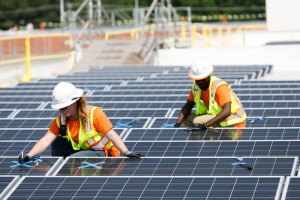From an Essay by Ivy Main, Power for the People VA, January 5, 2021
— BILLS for 2021 VIRGINIA GENERAL ASSEMBLY (continued) —
§ – Right to buy — It’s a strange paradox – The Virginia Clean Economy Act is one of the most ambitious clean energy laws in the U.S., calling on our utilities to add thousands of megawatts of solar and wind energy in the coming years. And yet most Virginia customers still can’t buy solar energy unless they install it on their own property.
This is an absurd position for Virginia to be in today, insisting on an energy transition but not allowing customers to actually go buy electricity from solar. Indeed, this restriction threatens Virginia’s ability to meet its carbon reduction goals, for one reason in particular: data centers.
Data centers are energy hogs, and this sector has grown so fast in Virginia it now makes up 12 percent of Dominion Energy’s total electric demand in the state. Most data center operators say they want to run on renewable energy, and we need them to make good on that. Otherwise, cutting carbon will be harder and more expensive for the rest of us.
But we have to make it possible for them to do so. Right now, only the really big companies, like Microsoft or Facebook, can get Dominion to come to the table on solar deals. The rest don’t have that kind of market power. Neither, of course, do residential customers and small businesses.
The irony is that customers actually had the right to go outside their utility to buy 100% renewable energy until just recently. The Virginia Code gives customers that right so long as their own utility wasn’t offering a 100% renewable energy product. But first Appalachian Power, and then Dominion Energy Virginia, triggered a “kill switch” by offering their own products. The trouble is, these products cost more, use existing facilities instead of adding new renewable energy to the grid, and in Dominion’s case, include the poison pill of dirty biomass energy.
Last year saw the passage of a bill patroned by Del. Jeffrey Bourne, D-Richmond, that would return to customers their right to go outside their utility to buy renewable energy from sellers who qualify as competitive service providers. But there was a catch: an amendment tacked on at the last moment made the bill effective only if passed again in 2021.
Delegate Bourne is bringing the bill back this year, with added language that would require competitive service providers who sell renewable energy in Virginia to offer a discount to low and moderate income consumers. The providers would have to offer 100% renewable energy at a 10% discount off the cost of the utility’s standard residential rate.
§ – Solar for public schools and other government buildings — Last year the VCEA and Solar Freedom legislation expanded the ability of customers to finance onsite solar projects by raising the cap on third-party power purchase agreements (PPAs) and making the program available to a wider range of customers in Appalachian Power territory, where it had previously been restricted. The new limits in Dominion territory are 500 MW for “non-jurisdictional” customers like local governments and schools and 500 MW for “jurisdictional” customers like residents and businesses; in Appalachian Power territory the new limit is 40 MW for all customers. This year a bill from Sen. John Edwards, D-Roanoke, clarifies that the program in Appalachian Power territory applies to non-jurisdictional customers as well as jurisdictional customers.
The bill also expands a pilot program for municipal net meteringestablished in 2019 that allowed a local government to use surplus electricity generated by solar panels on one building for another building also owned by the locality. As originally enacted, however, the pilot program did not allow the locality to use PPA financing for its solar panels, a restriction that prevents budget-conscious local governments from using the program. Senator Edwards’ bill will let local governments of both Dominion and APCo use PPAs for solar projects installed under the pilot program. In addition, the previous caps on the municipal net metering pilot program are removed in favor of the general PPA program caps.
§ – Environmental Justice — – Del. Shelly Simonds, D-Newport News, and Keam are expected to introduce a bill that will expand last year’s Environmental Justice Act to change how the state forms and carries out environmental justice policies within agencies, and to ensure greater public involvement in the permitting process at VA DEQ. Among other issues, residents often learn too late that Virginia’s Department of Environmental Quality has finalized a permit for a facility that will add to the pollution in their community. The legislation would also require VA DEQ to consider the cumulative impact of polluting facilities — that is, to take into account whether the community is already overburdened.
LIST OF BILLS to be continued tomorrow.

